Zondervan World Religions Collection (10 vols.)
Digital Logos Edition
Overview
The Zondervan World Religions Collection offers a powerful examination of many major world religions, including Mormonism, Hinduism, Buddhism, Judaism, Christianity, Islam, and various African religions. Presenting each religion’s culture, philosophy, practices, history, and more, these books provide an extensive introduction to world religions. It is more important than ever to not only know one’s own faith, but to understand the belief systems held by those occupying one’s family, social circles, job, city, country, and world. This collection not only educates you as to the many beliefs outside of Christendom, it also lays out valuable information, and offers advice on how to witness to loved ones who differ in religion.
With the Logos Bible Software edition of this collection, you have unprecedented access to resources that offer relatable and insightful material for your study. Hours of biblical research can be accomplished with the simple click of a mouse. With lightning-speed searching, instantly-viewable Scripture references, a vast library of resources, and much more, Logos is the perfect software to expand your understanding of world religions.
Key Features
- Presents an introduction to various world religions
- Analyzes each religion’s beliefs, culture, philosophy, practices, history, and stories
- Provides practical advice for ministering to others of different religions
Product Details
- Title: Zondervan World Religions Collection
- Publisher: Zondervan
- Volumes: 10
- Pages: 3,160
- Resource Type: Topical
- Topic: World Religions
Individual Titles
- The Challenge of the Cults and New Religions by Ron Rhodes
- Encyclopedic Dictionary of Cults, Sects, and World Religions by Larry A. Nichols, George Mather, and Alvin J. Schmidt
- Is the Father of Jesus the God of Muhammad? by Timothy George
- The Mormon Mirage by Latayne C. Scott
- My Neighbour’s Faith by John Azumah
- The New Mormon Challenge by Francis J. Beckwith, Carl Mosser, and Paul Owen
- Understanding the Book of Mormon by Ross Anderson
- Understanding the Koran by Mateen Elass
- Understanding World Religions: An Interdisciplinary Approach by Irving Hexham
- Understanding Your Mormon Neighbor: A Quick Christian Guide for Relating to Latter-Day Saints by Ross Anderson
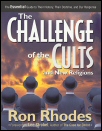
In this essential resource, preeminent cult authority Ron Rhodes explains what cults are, why they are cause for concern, and why in the 21st century, as never before, their numbers and memberships are exploding nationally and worldwide. Drawing on his extensive experience as a cult researcher, Rhodes offers to-the-point, cutting-edge information on twelve major cults and new religions.
Ron Rhodes is the president of reasoning from the Scriptures Ministries. He is the author of 18 books, including two Silver Medallion Award winners. He is heard nationwide on radio.
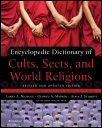
Encyclopedic Dictionary of Cults, Sects, and World Religions is arguably the most significant reference book on the subject to be published. Formerly titled Dictionary of Cults, Sects, Religions, and the Occult, it provides reliable information on the history and beliefs of nearly every form of religion active today. This extensively revised edition includes new topics, updated information, and a brand-new format for a clearer, more organized approach.
Larry A. Nichols is the pastor of Our Redeemer Evangelical Lutheran Church in Greenville, Rhode Island. He is coauthor of Masonic Lodge in the Zondervan Guide to Cults and Religious Movements.
George A. Mather is the pastor of Our Savior Lutheran Church in St. George, Utah, and is the coauthor of Encyclopedia Dictionary of Cults, Sects, and World Religions.
Alvin J. Schmidt retired in 1999 as professor of sociology at Illinois College in Jacksonville, Illinois, where he still lives. He is the author of several books, including The Great Divide: The Failure of Islam and the Triumph of the West, and served as a consulting editor for Dictionary of Cults, Sects, Religions and the Occult.
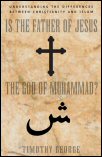
Today as never before, the world’s second largest religion is shaping our culture, and words such as jihad, imam, Quran, and fatwa have entered our vocabulary. While all Muslims are no more alike than all Christians are alike, there are certain fundamental beliefs that all Muslims hold in common—some of which Christians would agree with, including belief in one true God. But is it the same God? How does the God of Muhammad differ from the God of Christianity?
Written in a clear, passionate style that is conciliatory, balanced, and uncompromisingly biblical, this book describes and contrasts the distinctives of Christianity and Islam. Its author, a noted historian and theologian who has studied Islam for many years, writes with an eye on helping Christians better understand how to interact with Muslims.
Timothy George is the founding dean of Beeson Divinity School of Samford University. An executive editor of Christianity Today, Dr. George has written more than 20 books and regularly contributes to scholarly journals.
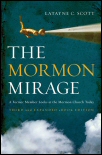
In the first edition of The Mormon Mirage, Latayne C. Scott shared her remarkable journey out of Mormonism as she uncovered shocking inaccuracies, inconsistencies, and contradictions in the faith she had loved and lived. Thirty years later, Mormonism and Mormon scholarship have evolved with the times. In this third, revised and updated edition of her well-known book, Scott keeps pace with changes and advances in Mormonism, and reveals formidable new challenges to its claims and teachings.
I applaud the sensitivity and understanding invested in this enormous work.
—Ravi Zacharias
Latayne C. Scott was Mormon for 10 years, attending Brigham Young University on a writing scholarship and working as a staff member for two of BYU’s weekly magazines. She is the author of fourteen published books, including Latter-Day Cipher, Why We Left Mormonism, and The Hinge of Your History: The Phases of Faith. She has also published articles and poems in secular magazines and in major Christian magazines, and she is the recipient of Pepperdine University’s Distinguished Christian Service Award for her writing.
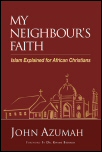
Nowhere else in the world have both Islam and Christianity been more instrumental in shaping the history of a people and their way of life than in Africa. African Muslims and Christians have a lot in common, including kinship ties, shared languages and citizenship. Yet, despite the centuries of deep historical links and harmonious existence between the two religions, new challenges threaten this harmony. Conflicts involving Christians and Muslims in places like Sudan, Nigeria and Ivory Coast are common. These conflicts are fueled primarily by ignorance, stereotyping and prejudice, which in turn breed fear, suspicion and even hatred, in some cases leading to violence.
My Neighbour’s Faith sheds light on the beliefs and teaching of Islam by addressing matters of contemporary importance to Christians and the wider non-Muslim audience. It presents the human face of Islam—the face of a close relative, a neighbour, a teacher and even a head of state—in a balanced and critical way that gives a credible view of Islam.
John Azumah holds a PhD in Islamics from the University of Birmingham, UK, and is the director for the Centre of Islamic Studies at the London School of Theology. He has previously served as a research fellow with the Akrofi-Christaller Institute in Ghana. Dr. Azumah is the author of The Legacy of Arab-Islam in Africa: A Quest for Inter-Religious Dialogue and has written articles on the subject in various academic journals.
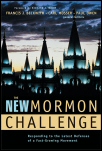
Written by an international team of respected Christian scholars, this freshly researched rebuttal of Mormon truth will aid those sharing the gospel with Mormons and those investigating Mormonism on their own. It will help readers to accurately understand Mormonism through biblical, historical, scientific, philosophical, and theological discussions.
I applaud the sensitivity and understanding invested in this enormous work.
—Ravi Zacharias
Francis J. Beckwith is professor of philosophy and church-state studies, and codirector of the program in philosophical studies of religion in the Institute for Studies of Religion, at Baylor University in Waco, Texas. A graduate of Fordham University and the Washington University School of Law, St. Louis, his books include Law, Darwinism, and Public Education: The Establishment Clause ad the Challenge of Intelligent Design, To Everyone An Answer: A Case for the Christian Worldview, and Do the Right Thing: Readings in Applied Ethics & Social Philosophy.
Carl Mosser has published significant articles on Mormonism in both evangelical and Mormon journals.
Paul Owen is assistant professor of Bible and religion at Montreat College. He has published significant articles on Mormonism in both evangelical and Mormon journals. He lives in Asheville, North Carolina.
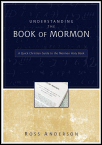
A former Mormon and an adult convert to Christianity, author Ross Anderson provides a clear summary of the Book of Mormon including its history, teachings, and unique features. Stories from the author and other ex-Mormons illustrate the use of Mormon scripture in the Latter-day Saint church. Anderson gives special attention to how the Book of Mormon relates to Christian beliefs about God, Jesus, and the Bible.
Ross Anderson (DMin, Salt Lake Seminary) is the founding pastor of Wasatch Evangelical Free Church in Roy, Utah, where he served for 28 years. He is currently a teaching pastor at Alpine Community Church, a multi-site congregation in northern Utah, and Director of Utah Advance Ministries. He was born in Utah and raised in California as an active member of the Mormon (Latter-day Saint) Church. His passions including planting culturally appropriate churches in Utah and incorporating former Mormons into the local church.
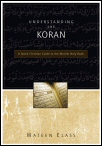
This volume is a quick nontechnical, introduction to the Koran designed to help Christians understand a hidden book revered by 1.3 billion Muslims, covering the background on its writing, a summary of its contents, a perspective on how it’s used and viewed by Muslims, a comparison of differences and similarities to the Bible, and some suggestions on how it should and should not be used in conversations with Muslims. Find out how the Koran resembles the Bible—and the drastic ways in which it differs. Understanding the Koran gives you a fascinating essential grasp of Islam’s holy book: where it came from, what it teaches, how Muslims view it, and how the Allah of the Koran compares with the God of the Bible.
Mateen Elass was raised in Saudi Arabia in a Muslim environment. He holds degrees from Stanford University, Fuller Theological Seminary, and a PhD from the University of Durham in England. He has served in a church in Colorado and currently serves as senior pastor of a Presbyterian church in the Midwest. He has written feature articles for Moody magazine, including “What Muslims Think of America.”
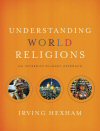
Globalization and high-speed communication put twenty-first century people in contact with adherents to a wide variety of world religions, but usually, valuable knowledge of these other traditions is limited at best. On the one hand, religious stereotypes abound, hampering a serious exploration of unfamiliar philosophies and practices. On the other hand, the popular idea that all religions lead to the same God or the same moral life fails to account for the distinctive origins and radically different teachings found across the world’s many religions.
Understanding World Religions presents religion as a complex and intriguing matrix of history, philosophy, culture, beliefs, and practices. Hexham believes that a certain degree of objectivity and critique is inherent in the study of religion, and he guides readers in responsible ways of carrying this out. Of particular importance is Hexham’s decision to explore African religions, which have frequently been absent from major religion texts. He surveys these in addition to varieties of Hinduism, Buddhism, Judaism, Christianity, and Islam.
An ideal, clear, and lively introduction to world religions for North American students that also briefly deals with their modern developments, e.g. in the field Buddhism.
—Michael Hahn, professor of Indology and Tibetology, Philipps-University, Marburg, Germany
A book that goes beyond mere description to engage real, and often controversial, issues. All university teachers grappling with these issues will find it of great use. Unlike most texts of this nature, it has an extensive section on African traditions that ought to interest scholars teaching African politics. It is a highly commendable piece of work.
—Henry Srebrnik, professor of political studies, University of Prince Edward Island
Hexham offers an introduction to the study or religion based on his years of teaching the subject, an impressive multi-cultural knowledge of various religious traditions, and in a style that is readable and engaging. Not another boring catalogue of religious beliefs and practices looked at from a pseudosophisticated afar, Hexham’s book conveys something of the diversity and controversies involved in the academic study of religions.
—Larry Hurtado, professor and director of the Center for the Study of Christian Origins, The University of Edinburgh
Many Western presentations of Islam merely pass on selected remarks from unreliable tertiary sources. Irving Hexham’s chapters on Islam are unique in that they reach beyond library versions, Muslim polemic, and Western politically correct advocacy to the actual discourse of devoted Muslims around the world today. Hexham takes seriously the sourcebooks through which Muslims understand their faith and practice, and the perspectives of recent authors whose influence shapes modern Muslim views. He rightly relies on some of the strongest scholarly studies of Islam for his analysis and evaluation, which sheds light on a subject that remains confusing for many Westerners.
—Gordon Nickel, author of Narratives of Tampering in the Earliest Commentaries on the Qur’an
I enjoyed the chapters on Indian religions enormously. They are enlightening and fascinating for anyone who has brushed the surface of India and its religious traditions. The author has produced a work that is very readable and thought-provoking, but more importantly, one that brings the religions to life in a practical way.
—Bill Warden, Canadian Ambassador to Pakistan (1981–1983)
Irving Hexham is professor of religious studies at the University of Calgary and adjunct professor of world Christianity at Liverpool Hope University. He has published 27 academic books, including The Concise Dictionary of Religion, Understanding Cults and New Religions, and Religion and Economic Thought, plus eighty major academic articles and chapters in books, numerous popular articles, and book reviews.
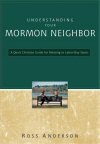
More than a belief system, Mormonism is a cultural identity that shapes the worldview, values, and lifestyles of those involved in the Church of Jesus Christ of Latter-day Saints. In Understanding Your Mormon Neighbor, Ross Anderson seeks to help Christians relate to Latter-day Saints by giving insights into Mormon life and culture. Anderson’s work is supported both by his lifetime of experiences growing up Mormon and by current research that utilizes many Latter-day Saints’ own sources.
This volume explains the core stories that form the Mormon worldview, shares the experiences that shape the community identity of Mormonism, and shows how Mormons understand truth. Anderson shares how most Mormons see themselves and others around them, illuminating why people join the LDS Church and why many eventually leave. Latter-day Saints will find the descriptions of their values, practices, and experiences both credible and familiar. Understanding Your Mormon Neighbor suggests how Christians can befriend Latter-day Saints with confidence and sensitivity and share the grace of God wisely within their relationships. Anderson includes discussion questions for individuals and small groups, black and white photographs and charts, and an appendix that includes “Are Mormons Christians?” and “Should I Vote for a Mormon?”
Ross Anderson (DMin, Salt Lake Seminary) is the founding pastor of Wasatch Evangelical Free Church in Roy, Utah, where he served for 28 years. He is currently a teaching pastor at Alpine Community Church, a multi-site congregation in northern Utah, and Director of Utah Advance Ministries. He was born in Utah and raised in California as an active member of the Mormon (Latter-day Saint) Church. His passions including planting culturally appropriate churches in Utah and incorporating former Mormons into the local church.